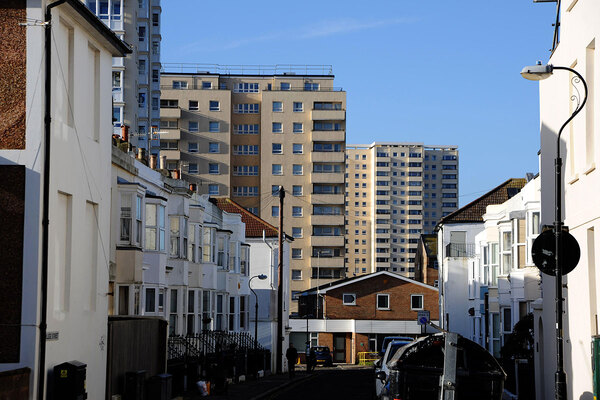‘Direct investment and more power to councils’: sector responds to Right to Buy consultation
Local authorities need increased investment and should be given more control over the Right to Buy in their areas, according to responses to a government consultation. Stephen Delahunty looks at the key takeaways
Launched in November, the government is targeting reforms that include extending the length of time someone has to be a tenant before they can buy their council home.
At the moment, there is a three-year minimum tenancy period to be eligible to apply under the scheme.
Labour is considering preventing tenants from buying newly built social homes for a given period, and targets to replace all future sales on a one-for-one basis with a social home.
It confirmed that it will not be extending the Right to Buy (RTB) to housing associations because of the cost to the taxpayer and the likely reduction in social housing stock.
It is also proposing to increase the period in which councils can ask for repayment of all or part of the discount received when a property is sold from five years up to 10, as well as making changes to the minimum and maximum discounts that will apply to both houses and flats.
Below are some of the key responses from the sector.
NHF
The National Housing Federation (NHF) welcomed the government’s decision to reform the policy and the confirmation that it will not be extended to housing associations.
The body supports the review of RTB discounts and believes the minimum percentage should be 0% and the maximum should be 5%. This should apply to flats and houses equally.
There should be exemptions for sheltered housing and housing identified as suitable for older people, and in all parishes with populations of 3,000 or fewer, and in all rural parishes in National Parks and Areas of Outstanding Natural Beauty.
In its submission, the NHF said: “Previous voluntary Right to Buy pilots demonstrated that the scheme led to a net loss of social housing. There is not enough money from sales to build new social homes to replace those sold: less than half of the homes sold through the pilot schemes were replaced. Those that were sold were rarely sold at social rent levels.”
Inside Housing previously revealed that only 10 homes had been sold through the RTB pilot a year since its launch. A later report discovered that only £10m of the allocated £200m had been spent on the pilot.
The NHF added: “Right to Buy reform is a welcome step to tackle the housing crisis, which is affecting people in every part of the country. We support the government’s ambition to build 1.5 million new homes, but we can only achieve this with the right support. We look forward to a new long-term housing strategy announced at the next Spending Review, including a significant boost in funding for social housing.
CIH
The Chartered Institute of Housing (CIH) and the Local Government Association (LGA) have called for an increase in the secure tenancy eligibility requirement. The NHF also backs this call and believes it should be set to at least 10 years or more.
Gavin Smart, chief executive of the CIH, said: “[The] CIH welcomes the opportunity to respond to the government’s consultation on proposed reforms to the RTB. We have long called for changes to limit the loss of social housing through RTB sales and strongly support many of the proposals.
“Drawing on member feedback and extensive analysis from the UK Housing Review, we advocate for measures including a longer qualification period, updated exemptions, permanent exemptions for new builds and enhanced local authority control over housing stock.
“While these reforms are vital, true change requires significant investment in new social rented homes. We urge the government to prioritise this in forthcoming funding decisions and empower local authorities to tailor RTB rules to local needs, reflecting the ‘devolution revolution’ and ensuring communities can thrive.”
LGA
The LGA revealed this week that some councils received more RTB applications in the three-week period after the government announced reforms than in a typical year.
This is why the LGA is calling on the government to undertake research to determine how many applications were made across the country in this time period, how many applications will be accepted and the resultant number of social housing stock lost.
In its submission to the consultation on reforming the RTB, the LGA said it recognised that the government had taken on board the key concerns of councils on the scheme, but it urged the government to go further to ensure it was fit for purpose and did not hinder the development of good-quality, sustainable social housing stock.
Local authorities are expected to save nearly £1.2bn by 2029-30 from RTB reductions and being able to retain full receipts from social housing sales.
Adam Hug, housing spokesperson for the LGA, said: “We are pleased with the steps the government has taken so far, but we urge further reform to ensure local authorities can properly manage the RTB scheme and address the chronic shortage of social housing.
“It is crucial that local authorities are given the power to shape the scheme to fit the needs of their communities.
“Councils want to work with government to deliver the social homes our communities need and help relieve the financial [strain] this shortage is placing on councils, and further RTB reform is a crucial way to do this.”
The LGA said this should include local authorities being given the control, power and flexibilities to shape the RTB scheme to best serve their local housing market and residents’ needs. This includes power to set the discount rate, exempt newly built properties in perpetuity and protect their investment in retrofitting or improving their existing stock.
The government should also allow councils to retain their RTB receipts indefinitely to ensure delivery of replacement homes is maximised.
London Councils
London Councils made a couple of key points in its response to the consultation. It described the current policy framework as “increasingly challenging given the pressures on housing in the capital and the unsustainable impact on local authority homelessness services”.
Reform is necessary because the body has found that London boroughs were spending £4m per day on temporary accommodation in 2023-24, while Housing Revenue Accounts have been stretched due to the increasing demand for housing services, and the cost of housing development has risen.
This has meant that, in many cases, the promised one-for-one replacement of sold homes under the RTB scheme has not been realised. Therefore, London Councils strongly advocates for the full devolution of responsibilities for setting RTB policy to local authorities.
The group said: “We believe that local councils are best placed to make these decisions, as they are the original developers of these homes and have a deep understanding of, and responsibility for managing, the specific housing needs within their communities.”
NHC
Tracy Harrison, chief executive at the Northern Housing Consortium (NHC), said: “We welcome the government taking action on the RTB. While the scheme has undoubtedly benefited some tenants, it has also led to a catastrophic loss of social housing, as waiting lists soar. Since 2012-13, over 32,000 homes in the North that have been sold, but only one in seven has been replaced.
“The loss of social housing has not always led to homeownership. Nationally, over 40% of RTB homes have ended up in the private rented sector, often at unaffordable rent levels. Reform of the levels of discount is long overdue. Large discounts are a barrier to replacement of homes and have acted as an incentive for abuse of the system.
“We particularly welcome proposals to exempt newly built homes, as this will help councils develop new social housing with confidence. The confirmation that the RTB will not be extended to housing associations is also long overdue.”
Similar to many of the consultation responses, the NHC would like to see more control given to local authorities, which should be able to set discounts at a level which will allow them to replace homes or use alternative means to retain social housing, such as portable discounts.
Ms Harrison added: “In areas facing the most acute housing shortages for certain types of homes, local leaders should be able to suspend the programme. There is not a one-size-fits-all answer. Local authorities are best placed to implement solutions which address the needs of their community.”
SHAC
From the view of residents, the Social Housing Action Campaign (SHAC), said it believes “the consultation underscores Labour’s ongoing obsession with homeownership over renting”.
SHAC said: “Low-rental council housing plays a vitally important role in people’s life chances, but all three main political parties have been responsible for a catastrophic decline in its supply over the last few decades.
“The damage is most immediately felt in the housing crisis, but beyond that, there is a negative impact on many other aspects of society’s economic and social health. The RTB scheme has been one of the mechanisms leaking homes from under democratic local government protection and into the hands of private landlords – more than 40% of RTB housing ends up privately rented.”
SHAC and many other housing campaign groups have long argued that the scheme needs to be withdrawn entirely. The group believes that council housing needs direct investment to build on a mass scale without being outsourced to private developers.
This would reduce the huge amount being spent on temporary accommodation and housing benefit.
SHAC added: “This is the kind of bold, radical action that is needed. The Labour government needs to ask whose interests should be given priority, and SHAC believes that it is time to focus on the needs of tenants and residents.”
Housing Forum
The Housing Forum’s view is that the RTB should be abolished. It is supportive of the reforms proposed because they will slow the loss of social housing stock.
The main points it raised in its consultation response were that councils should be given discretion to exclude properties from the scheme, such as those in particularly short supply locally.
New build housing, built after these changes are made, should be permanently excluded. Plus, councils should be free to use the receipts however they see fit, to replace the housing or invest in existing homes.
The government told Inside Housing that it will outline its next steps following the consultation in due course.
However, a Ministry of Housing, Communities and Local Government spokesperson said recently: “Too many social homes have been sold off and not replaced, directly contributing to the worst housing crisis in living memory. That is why we are taking decisive action to reform the RTB scheme to make it fairer, where longstanding tenants can buy their own homes but, crucially, councils can replace them.
“This is part of our commitment to deliver the biggest increase in social and affordable housebuilding in a generation, including major planning changes to support the much-needed delivery of affordable homes.”
Recent longform articles by Stephen Delahunty
How recent changes to debt rules could affect the housing sector
The first Labour Budget in 14 years suggested that the chancellor has been listening to the social housing sector. Stephen Delahunty sums up the funding announcements that will have the biggest impact for housing providers
How will exemption from the local connection test work?
The government announced it would exempt certain groups from the local connection test when they apply for social housing. Stephen Delahunty finds out what sector figures think is needed for it to work
Sign up for our Council Focus newsletter
Already have an account? Click here to manage your newsletters












